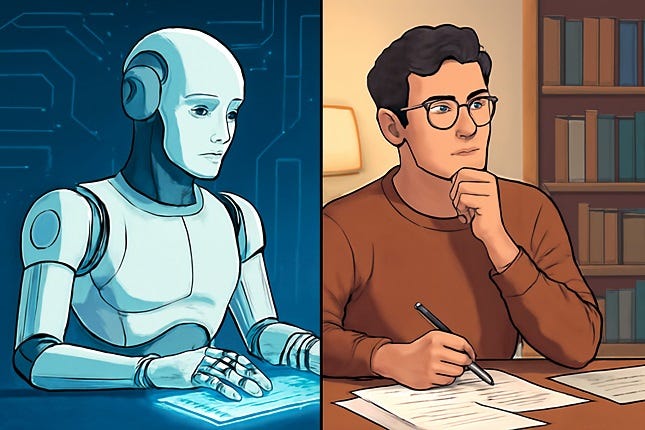The rise of artificial intelligence has sent shockwaves through countless industries, and content creation is no exception. With tools like ChatGPT generating articles, essays, and marketing copy at lightning speed, many wonder if human writers are becoming obsolete. Yet despite the impressive capabilities of AI language models, human expertise continues to reign supreme in ways that matter most.
The AI Writing Revolution

There’s no denying that AI writing tools have transformed how content gets created. These systems can produce grammatically correct text on virtually any topic within seconds, handle multiple languages, and maintain consistent tone across thousands of words. For basic informational content, social media posts, and first drafts, AI has proven remarkably capable.
The efficiency gains are undeniable. What once took hours of research and writing can now be completed in minutes. Small businesses can generate product descriptions, marketers can create ad copy variations, and students can overcome writer’s block with AI assistance.
Where Human Writers Excel

However, beneath the surface of AI’s impressive output lies a fundamental limitation: the absence of genuine understanding, lived experience, and creative intuition that defines exceptional writing.
Authentic Voice and Perspective
Human writers bring something irreplaceable to their work—authentic personal experience. When a travel writer describes the smell of street food in Bangkok or a business expert explains the nuances of navigating a difficult merger, they’re drawing from real memories and emotions. This authenticity creates connections with readers that AI, despite its sophisticated pattern matching, cannot replicate.
Complex Analysis and Critical Thinking
While AI excels at summarizing information, human writers provide the critical analysis that transforms data into insight. They can identify contradictions in sources, challenge prevailing assumptions, and synthesize information from disparate fields in ways that reveal new understanding. This analytical depth requires not just intelligence, but wisdom gained through experience.
Cultural Sensitivity and Context
Human writers understand the subtle cultural contexts that AI often misses. They know when a reference might be offensive, when humor falls flat, or when certain arguments won’t resonate with specific audiences. This cultural intelligence, developed through years of social interaction and feedback, remains beyond AI’s reach.
Stakeholder Relationships and Trust
In professional writing contexts, relationships matter enormously. Clients trust human writers who understand their industry’s unspoken rules, who can participate in strategic conversations, and who take personal accountability for their work. These trust-based relationships form the foundation of successful long-term writing partnerships.
The Creative Advantage
Perhaps most importantly, human writers possess genuine creativity—the ability to make unexpected connections, challenge conventions, and create entirely new frameworks for understanding complex topics. While AI generates variations on existing patterns, human creativity can transcend those patterns entirely.
Consider the difference between an AI-generated article about climate change and one written by a scientist who has spent decades studying melting glaciers. The human brings not just knowledge, but passion, frustration, hope, and the ability to craft metaphors that make abstract concepts viscerally understood.
The Collaboration Future
Rather than viewing AI as a threat, the most successful human writers are learning to leverage these tools as sophisticated research assistants and brainstorming partners. AI can handle initial research, generate multiple angle options, and help overcome creative blocks, freeing human writers to focus on what they do best: thinking critically, writing authentically, and connecting genuinely with their audiences.
Quality That Matters
While AI may produce content faster and cheaper, the question remains: what kind of content do we ultimately value? The most memorable articles, the most persuasive arguments, and the most moving stories still come from human minds that can weave together logic and emotion, facts and meaning, information and inspiration.
In an age of information overload, readers increasingly seek content that doesn’t just inform, but enlightens. They want writers who can cut through complexity to reveal truth, who can challenge their thinking, and who can articulate the human experience with clarity and grace.
The future belongs not to AI or human writers alone, but to human writers who understand how to harness AI’s capabilities while delivering the authenticity, insight, and creative excellence that only human expertise can provide. In this partnership, our human writers don’t just compete with AI—they transcend it.


